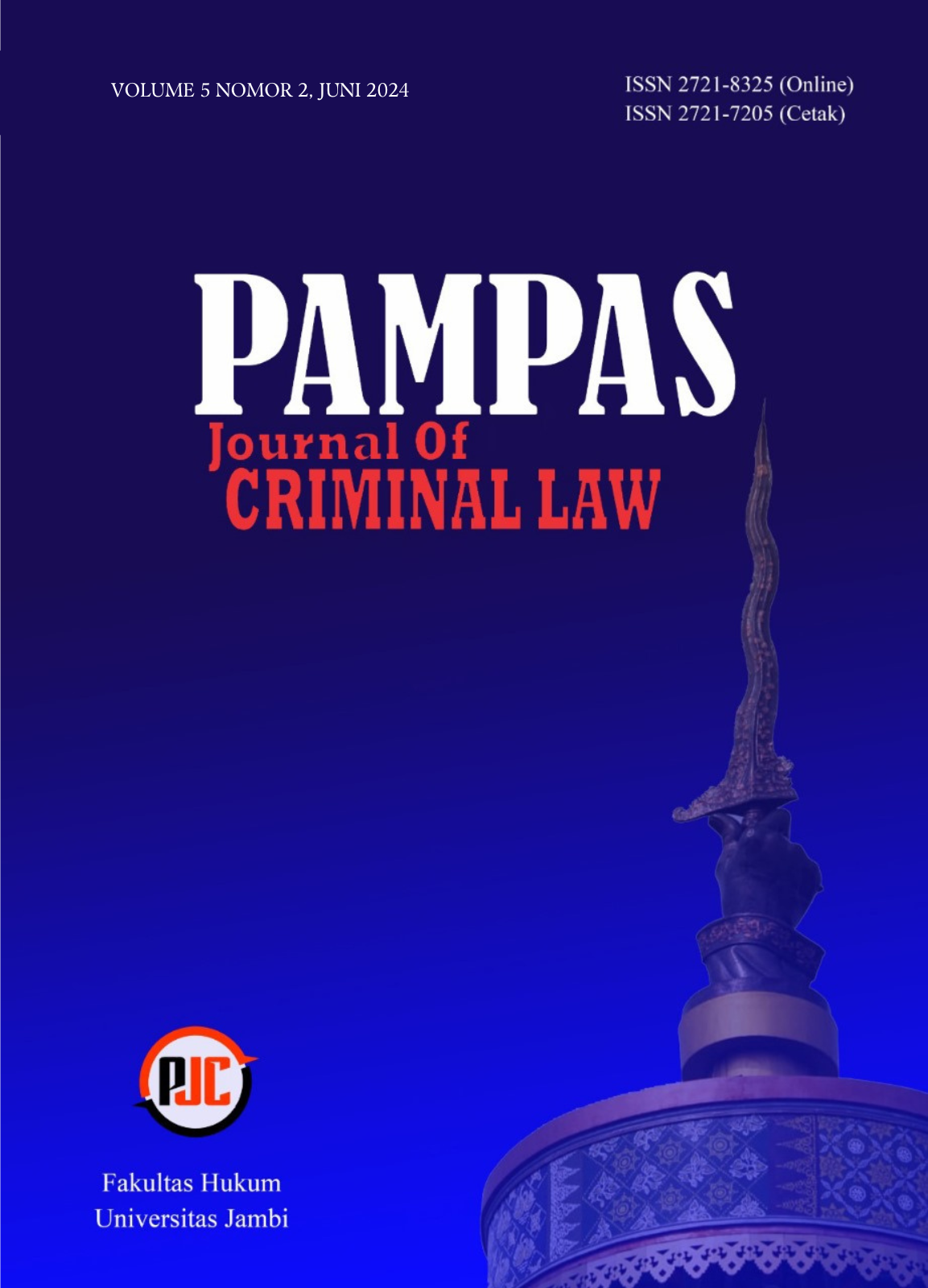Dasar Pertimbangan Hakim Dalam Menjatuhkan Pidana Bersyarat Kepada Anak Pelaku Yang Menyebabkan Kematian
DOI:
https://doi.org/10.22437/pampas.v5i2.33289Keywords:
Criminal Conditional, Judge, Children in confront with the lawAbstract
This study aims to analyze and find out the basis and reasons for the panel of judges to impose criminal conditional on children who are perpetrators of abuse that cause death. The role of the authorized judge in imposing the sentence must go through various considerations. In verdict No. 12/Pid.sus-Anak/2021/PN Jmb it pertains to a severe assault case where the victim died as a result of the juvenile's delinquent behavior. This study uses a normative juridical method. The findings of this research reveal that the imposition of criminal conditional on children who are in confront with the law because judges is primarily based on sociological considerations. Sociological considerations encompass aggravating and mitigating factors, which the judge is obliged to include in the verdict according to Article 197, paragraph (1) of the Indonesian Criminal Procedure Code. The main reason for the panel of judges to impose a suspended sentence is not for retribution purposes but to provide an opportunity for the juvenile to reintegrate into society and become a better individual, hence the child is given a criminal conditional with the general conditions of probation for 10 (ten) months and specific conditions that must be fullfilled in accordance with Article 14 of the Indonesian Criminal Code and this case adhered to the guidelines of Law Number 11 of 2012 concerning the Juvenile Criminal Justice System.
Downloads
References
Dokumen Hukum
Republik Indonesia, Undang-Undang Nomor 11 Tahun 2012 Tentang Sistem Peradilan Pidana Anak.
Republik Indonesia, Undang-Undang Nomor 48 Tahun 2009 Tentang Kekuasaan Kehakiman.
Buku:
Mulyadi, Lilik. Kompilasi Hukum Pidana dalam Perspektif Teoristis dan Praktek pradilan. Bandung: Mandar Maju, 2007.
Adami Chazawi. Kejahata terhadap Tubuh & Nyawa. Jakarta: PT. Raja Grafindo, 2007.
Wadong, Maulana Hassan. Pengantar Advokasi dan Hukum Perlindungan Anak. Jakarta: Grasindo, 2000.
R Sugiharto. Sistem Peradilan Pidana Indonesia Dan Sekilas Sistem Peradilan Pidana Di Beberapa Negara. Semarang: Unissula Press, 2012.
Widyawati, Anis dan Ade Adhari. Hukum Penitensier Di Indonesia Konsep Dan Perkembangannya. Depok: Rajawali Press, 2020.
Muladi. Lembaga Pidana Bersyarat. Bandung: Alumni, 1985.
Jurnal:
Darmadi, AA Sagung Mas Yudiantari, "Pertimbangan Hakim Dalam Menjatuhkan Putusan Pidana Bersyarat." Jurnal Advokasi Vol.8 No.2 (2018). https://e-(journal.unmas.ac.id/index.php/advokasi/article/view/96
Ardiko G.M. Sitompul, Haryadi, Tri Imam Munandar, “Penahanan Terhadap Anak Pelaku Tindak Pidana,” PAMPAS: Journal Of Criminal Law, Vol.1 No.3 (2020). https://online-journal.unja.ac.id/Pampas/article/view/11090
Irawan, I. Kadek Agus, I. Nyoman Sujana, and I. Ketut Sukadana. "Tindak Pidana Penganiayaan Yang Mengakibatkan Matinya Seseorang (Studi Kasus Putusan Nomor: 24/Pid. B/2013/PN. Sp)." Jurnal Analogi Hukum Vol.1 No.3 (2019). https://www.ejournal.warmadewa.ac.id/index.php/analogihukum/article/view/1783
Internet:
Utomo, Anandito. “Arti Pidana Bersyarat Dan Pembebasan Besryarat”, Artikel, Hukum Online, 4 Juli 2013.
Downloads
Published
How to Cite
Issue
Section
License
Copyright (c) 2024 Pampas Journal

This work is licensed under a Creative Commons Attribution 4.0 International License.
This work is licensed under Creative Commons Attribution 4.0 International License. All writings published in this journal are personal views of the authors and do not represent the views of this journal and the author's affiliated institutions. Author(s) retain copyrights under the licence of Creative Commons 4.0 International (CC BY 4.0).



.png)





